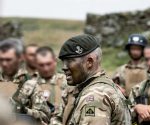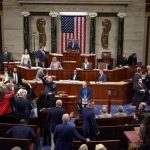In the land of the stupid and frightened, the go-along to get-along invertebrate is hero
Perhaps it isn’t decent for the comparatively youthful to pick fights with old men who might be too frail to defend themselves, and definitely not when the old man in question has passed over to that place in collective national remembrance worthy of their sainted person. One must, it should be supposed, wait a decent amount of time before there can be any criticism, especially when there would be an aspect of broaching a taboo, and defiling a sacred place in the environs of the refuge of the scoundrel.
But Tom Moore must be an exception.
Moore – and there will be no reference to him by “honours” or military rank here – was all too obviously a major element in UK Government’s efforts to have the population of a country believe that, in “Covid-19”, they were faced with the sort of crisis akin to a nation being at war with a mighty foreign power. It was a colossal lie, to facilitate a monumental act of racketeering, and to commit unlawful killing by economic blockade. Being ignorant of a crime is no defence, so even if Moore was exploited – which he wasn’t – it doesn’t save him. What is more, Moore doesn’t even appear the Second World War hero† that he was made out to be; e.g. “Moore face[d] unimaginable horrors while risking his life to fight for his country”. An adequate summary of his war career would be to say that he, like almost everyone else, let it all wash over him, and then like a lot of other people who were lucky enough to be in a position to make the best of a bad lot, tended toward the cushy number.
Having been instrumental in linking World War II with “Covid-19” (and when this term is used at FBEL in quotation marks, it refers to the myriad illness that has nothing to do with Covid-19, or SARS as it should be called), Moore also made the ultimate sacrifice as befitting a hero after the UK Government’s own heart, and died of “Covid-19”: he had had a case, in fact, of that sort of pneumonia that doesn’t exist anymore. One can speculate all they like about his having received an injection in the name of being vaccinated, but ultimately, and deeply ironically given the reason for his fame, his downfall would have been that he went from an old man struggling with his breathing in the care of family at home, to a man on an NHS hospital ward nominally there to receive a solution – as victims of the NHS always are.
It was entirely predictable that Moore would succumb to “Covid-19”. Anyone must be deeply stupid who didn’t understand that Moore was only fully useful to UK Government by not making it, and not making it before the fiasco fake pandemic had run its course.
At the start, though, even if Moore really was only a man verging on becoming a centenarian who wanted to do something to avoid losing the use of his knees (i.e. exercising by walking up and down on the land at his home), it was a situation that all too inorganically became a matter of the highest profile in national awareness. Moore was in limelight right at the start. It was reported that he had, by 17th April, 2020, completed a target for what had become so many sponsored laps around the garden, but before that he appeared on the BBC to receive news of raising £5 million, and it provides an example of how, very early on, there is the telegraphing of Moore’s activity as being in complete harmony with UK Government’s message for the psychological manipulation of the people, and something that he appears to knowingly, fully compos mentis, participate in. The following is what he said when he appeared on the programme:
When we started off with this exercise we didn’t anticipate we’d get anything near that sort of money. It’s really amazing. All of them, from top to bottom, in the National Health Service, they deserve everything that we can possibly put in their place. They’re all so brave. Because every morning or every night they’re putting themselves into harm’s way, and I think you’ve got to give them full marks for that effort. We’re a little bit like having a war at the moment. But the doctors and the nurses, they’re all on the front line, and all of us behind, we’ve got to supply them and keep them going with everything that they need, so that they can do their jobs even better than they’re doing now.
Just to cement the point, and to show how joined-up this operation was, here is the perspective from agents of UK Government in the executive branch and in parliamentary opposition, from the time in May 2020 when Boris Johnson announced that Moore would receive a knighthood:
Mr Johnson said: “Colonel‡ Tom’s fantastic fundraising broke records, inspired the whole country and provided us all with a beacon of light through the fog of coronavirus.
“On behalf of everyone who has been moved by his incredible story, I want to say a huge thank you. He’s a true national treasure.”
A Government spokeswoman added: “We know there is huge appetite to say thank you to all those supporting the nation during this emergency and doing incredible things day in, day out, up and down the country.
“We will ensure these unsung heroes are recognised in the right way, at the right time.”
Labour leader Sir Keir Starmer congratulated the captain, who he said had brought “inspiration to millions and helped all of us to celebrate the extraordinary achievements of our NHS”.
He added: “In his actions, Tom embodied the national solidarity which has grown throughout this crisis, and showed us that everyone can play their part in helping build a better future.”
This appeal by agents of UK Government to have people understand action taken in the name of fighting “Covid-19” as being the making of war time sacrifice, ultimately for the NHS, is something that was covered in the two-part Boris Johnson’s Big Lie In, And Lying series. And as a not so incidental aside, while the perversity of Johnson’s being “raised from the dead” on Easter was something written of there, let us now note that on May 1st, the day after Moore’s birthday, corporate-media could report that Moore had raised nearly £33 million to go the NHS (as if it didn’t waste enough), or the Temple (for the reason explained in aforesaid article).
The truth was, of course, that there was no “Covid-19” war, and the NHS was not on a front line, and its staff were not risking their life on a daily basis. Similarly, it appears, Moore’s risk-taking in the Second World War, which was being imagined as being something to directly compare the activity of NHS personnel, was also a myth. Naturally, the exposé to follow is to be served up alongside a demonstration of how corporate-media specifically, and despicably conducted itself to associate Moore with World War II heroism, now also linked with NHS heroism.
The following extracts are from a Mirror article published after Moore’s death that quotes extensively from statements made by Moore in an ITV documentary, “Captain Tom’s War”, of May 2020; note, then, the scale of the propaganda, in conjunction with newly announced plans to anoint him, at what might have been a very significant time for the entire psyop, when UK Government was about to abandon the Thursday night clapping “for carers” because of lack of public participation (not the official reason, of course – see here). It is also worth noting that ultimately, the war analogy was also somewhat rejected. [For the record, Moore’s medals were ones for service that all with a similar career as his will have received.]
Captain Sir Moore face unimaginable horrors while risking his life to fight for his country….
The war hero was always seen proudly wearing his medals and held the memory of his lost comrades close to him when he completed the epic challenge in April last year.
Capt Sir Tom, who tragically died in hospital after a brief battle with Covid-19 and pneumonia, had some fond memories of his time in the army.
However, the heartbreaking ordeal that the NHS hero faced and vile atrocities he witnessed would stay with him forever.
If one then expects Moore, in an interview shown in the ITV programme, to talk about his own experience of the brutality and fanaticism of the Japanese, he disappoints. He talks about these implacable foes, and the experience of fighting in the Burmese jungle in terms of what is universally known, and clearly not from a personal emotional understanding: “[the Japanese were] people who didn’t mind if they died”, and “They starved people to death and didn’t care. That was bad.”
Moore gives the impression that he might have been a motorcycle despatch rider in Burma, and as such had occasion to go to the frontline, but his Wikipedia entry merely states that he trained motorcyclists in Bombay and Calcutta – far away from any fighting. The Wikipedia entry also says that Moore took part in the general Burma campaign, that he had been in Arakan (on the west coast of Burma), and did specifically credit him with taking part in the Battle of Ramree Island, until it was edited out, with the editor commenting that the claim “needs a better source than BBC Obituary or ITV’s ‘Captain Tom’s War’”. In contrast, in what is perhaps the biggest moment of chutzpah in the Mirror piece, there is this astonishing claim:
Tom was involved in the massive amphibious assault on Arakan, the instrumental part of recapturing the colony, before pushing on with his troops to the capital, Rangoon.
And in the ITV documentary, Moore had had this to say:
“I [was]with the front of the Indian army, we all battled together. We were under fire constantly. There was an element of, of discomfort shall we say.”
The most striking thing about this statement is how a particularly and infamously tortuous form of warfare is so entirely inappropriately characterised. Again, Moore speaks like someone talking about characteristics of the campaign that would be generally known from other accounts, books, and television documentaries. One can’t help but suspect that his actual experience is more likely explained in this remembering:
“That was an entirely different world to anything I’d ever been in before but we survived,” he admitted.
“The air cooling on the train consisted of a galvanized container with a big lump of ice in it. Now that was the air cooling they had, which was quite necessary in India, it did get a bit hot.”
Moreover, the author proposes that if Moore was ever under fire in Burma, it would have been in the same way that the boys to entertain you in the fictional Royal Artillery concert party were. Moore perhaps even gives the game away with this:
“The worst fighting was at Imphal and Kohima where the really hand to hand battles were going on,” said Capt Sir Tom
“Where the British and the Indian army did such a fabulous job. Down in the area where I was, it was a more peaceful area because, well I say that peaceful, we were still under fire.”
Ultimately, Moore had transferred back to England by 1945 to be an instructor, and this might have been connected to a promotion to the rank of temporary captain in October of 1944. The bestowing of a temporary rank is essentially so that an individual meets a technical requirement in order to hold a post. In fact, there was nothing permanent about Moore’s rise from the basic commissioned officer, because his other promotion, which had been to war-substantive lieutenant, meant that he held a rank that applied only for the duration of the war. Indeed, it’s not clear to the author that Moore could properly be called a captain when the 2020 propaganda operation commenced. He certainly was a hero after the UK Government’s own heart.
We should note with great interest that Moore was not evidently devoured by guilt that he was at home for the Victory in Europe celebrations, while people he had previously served alongside had remained in India and Burma – not all having the great time he’d had, especially all those prisoners of the Japanese who had been delivered up into a living hell by simpering, twittish British Army officers who thought they were playing a game. Indeed, Moore was a hero after the UK Government’s own heart:
“We stopped instructing for the day and there were certain activities in the bars. A lot of girls and a lot of boys and put those together and you get a good time,” explained Capt Sir Tom.
“I wasn’t all that happy because all my friends were still out in the Far East, still fighting. They didn’t have a day off for VE Day, they were still fighting. I was a little bit unhappy about that bit.”
Three months later the Japanese surrendered and the war was finally over, which allowed Capt Sir Tom to look back at his experiences.
He added: “I can’t say I didn’t enjoy myself because I did, I really… being in the army, I really enjoyed being in the army and I’ve still got good thoughts of the army.”
† Note, this is not to say that the author is being judgemental regarding what qualities define a hero, his view being that the real heroes of this conflict which the UK Government sought and engineered were those who refused to serve. The point is to hoist UK Government by its own petard.
‡ Colonel of the Army Foundation College was Moore’s honorary rank, bestowed on his 100th birthday. While there is lots of corporate-media where Moore is referred to by the rank, the title didn’t stick. Perhaps it wasn’t favoured over captain because it was one pretend rank too far.
Further reading:
Analysis Of “Things To Come”, Part One: Mystery Babylon Does All The War – (link).
In Which We Observe H G Wells Agitating For A New World Order In 1940 – (link).
Once, Collect Scrap Metal; Now, Wear A Mask: When Is UK Government Going To Pay For Its Crime? – (link).
Ruled By A Vassal Government In The Neuordnung Europas, Deluded Britons Imagine They Won The War – (link).


















